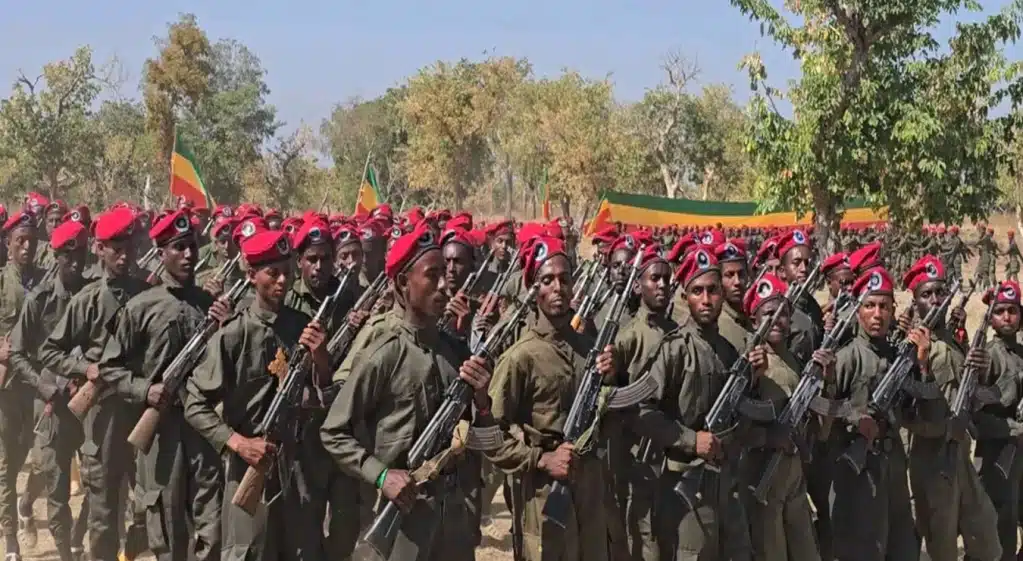
By Eyob Tilahun AberaWell-trained commando Fano elite force ready for the mission.
Ethiopia’s PM Abiy conducted a war on amhara to disarm Fanousing ground-to-air forces and drones but failed. Sadly, its forces are killing innocent civilians in revenge for their war defeat.
# U_g Distance to the awake you yourself! Avoid recent accounts! Let me not: Let’s refuse to say refuge! Flowing their rain on the Screen-Shat, and be trained by the Skin-Shat. Do not abide thy brotherhood and those who kill! pic.twitter.com/JlKTQxbQzW
— Nile Amhara Ethiopia (@Nileamhara) March 1, 2025
Surprisingly, the regime’s misstep enabled Fano to become highly armed, capable of fighting, and sophisticated in the chain of command, increasing the number of well-trained combatants. Now, Fano fully controls Amhara’s countryside and fights Abiy’s forces in towns.
Fano started a survival struggle with classical weapons, planning to arm itself by seizing armaments from the enemy. Fano can be called a pioneer freedom fighter who began his survival struggle with a strategy to seize weapons from an enemy and fight back.
Despite the regime’s efforts to invest in weaponsits forces quickly armed Fano during their massive surrender. Millions of Fano might be armed if they stay in the region too long.
The regime is fed up with the inefficiency of its troops who intentionally and/or forcefully surrender to Fano. The skyrocketing number of well-trained and armed Fano combatants frustrated the regime. Some reports indicated that the number of Fano combatants could quickly exceed millions.
In principle, a combatant’s success is not merely dependent on weaponry but also on their clarity of purpose in fighting. It is clear that Fano is struggling for the survival of ethnic Amharas but has no aim for Abiy’s troops to fight. Fano firmly proved its commitment to sacrifice for its people.
Abiy’s men moved into cities and attempted to battle with dronesfighter planes, and heavy artillery. However, it had little impact on the battlefield, instead resulting in civilian killings and destruction of the property.
Fano’s move to establish a single chain of central military and political command is another headache for the regime. Then, Fano will surely crush Abiy’s forces and swiftly drive them out of the Amhara region.
Since the war sparked in the Amhara region, Fano showed moral highness and a bid to protect international human rights that were grossly violated by Abiy’s regime.
The image depicts Abiy’s forces, who surrendered to Fano on the battlefield. Fano handled these forces per international law. Simon Veraan independent foreign journalist who visited them, saw Fano’s adherence to the rule of law, something Abiy’s men lacked.
Fano did not label any individual or group of people as a threat other than the dictatorship. As a result, it gained greater acceptability, allowing it to spread throughout the country, while others formed coalitions to oppose the tyranny.
# As we are We will train, be trained, battle, fight. It is a fact that an organized, trained force is always winning! Our Breeded Own For Our Journal Pronouncement: Adomon Fano!#WarOnAmhara #AmharaConcentrationCamps pic.twitter.com/Szkqm5DpjM
— Nile Amhara Ethiopia (@Nileamhara) March 1, 2025
In many armed struggles, insurgents are less likely to enforce the rule of law and protect international human rights than the government; the reverse is true in Fano’s case. So, there is no doubt that Fano will be the guardian of Ethiopia and the Horn of Africa.
Abiy’s regime, on the contrary, is becoming a security threat to the Horn of Africa. So, backing Fano is an appropriate strategy to secure the Horn of Africa by removing Abiy’s regime.
.
.
.
#Fano #emerging #key #actor #alternative #force #Horn #Africa #Habesha #Ethiopian #News #InDepth #AnalysisTop #Stories
Source link











